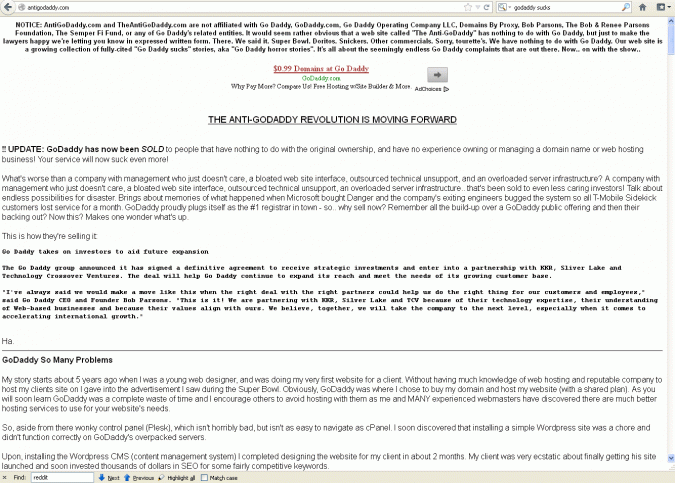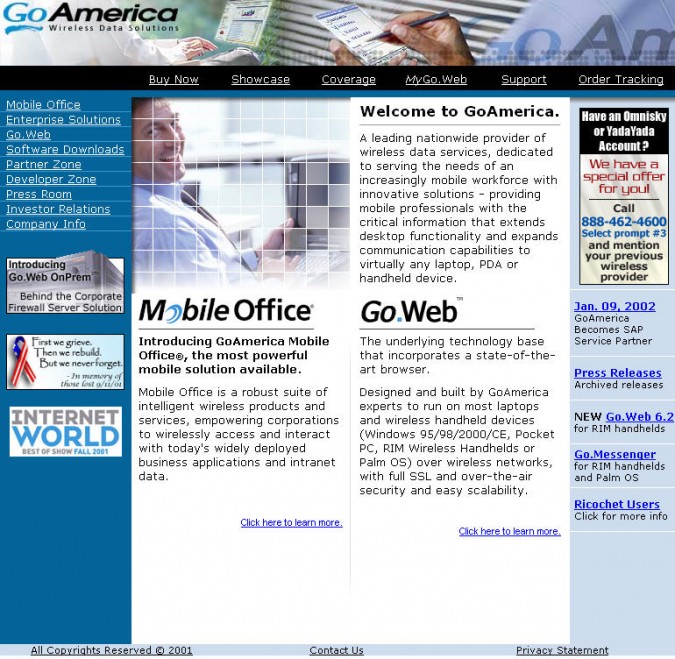Archive for the ‘Hotpaper.com’ tag
Consumers should be permitted to voice record conversations they have with companies
To my knowledge, in the United States it is illegal to record conversations unless you have permission of the parties you’re recording. I believe the rules are more lax in some jurisdictions, but those exceptions are not that helpful if one wants to record a phone conversation with a company representative, because call centers are so dispersed over the planet. A representative could be anywhere.
I think United States Federal law should be changed to specifically permit consumers to record conversations they have with employees and other representatives of companies. Nothing stops me from asking for permission today, but I have never been granted permission when I have asked, so that’s why the law should be changed.
Companies routinely give themselves the right to record calls, so they should understand why a consumer would also want to have that ability.
I came to my recommendation January 29, 2013, after I had a frustrating conversation that day with Brian G., a supervisor at Godaddy, the Internet domain name giant. Brian’s email address is briang@godaddy.com. Brian refused to give me his last name, citing a Godaddy security policy.
On or around December 14, 2012, I learned a domain I’ve been wanting for a dozen plus years was in ‘redemption.’ This means the prior owner didn’t pay to renew it, so the registrar placed the name into redemption, a kind of holding place for domain names before they are eventually released to the public for purchase.
My heart raced. I was going to finally be able to reacquire the Hotpaper.com domain. I sold the name in 2000. My first reaction was to write to my friend Dan Luis and ask if I could pay the redemption fee to Purple, the company I sold the name to a dozen years ago, so they could retrieve the name from redemption status. This would then give Purple the right to transfer the name to me.
But after I composed the email to Luis, who I have been in touch with as recently as 2012, I decided to run this idea past GoDaddy, which was the registrar for Hotpaper.com.
I told the representative about my connection with Purple and proposed doing what I just outlined. The representative then advised me to not bother, and just sign up for GoDaddy’s Domain Name Backorder service, which cost about USD $20.00 and included a full year of registration. This made the cost for getting the domain about $8.00, which is just 1/10th what it would have cost me to pay Purple to get the domain out of redemption status.
The representative told me that since GoDaddy was the registrar for Hotpaper.com that they would be able to get the domain name for me through their backorder service. He said that if Hotpaper.com had been with another registrar then they would have had to fight to try to get the name. The representative assured me multiple times that in this situation their backorder service was a sure thing. Not once did he even hint that I would be rolling the dice. Had he alerted me that I was speculating, I would have hung up and pursued the sure thing of contacting Luis.
Either Luis would have redeemed the name for Purple to hold on to, or he would have allowed me to redeem it through Purple. Luis would not have ignored me and let the name hit the open market — he’s my friend, and even though we haven’t seen each other in ages, we share a bond, for we both sold our companies to the company that is now Purple. Why am I so sure of this? Luis is the one that keeps our association alive by saying hello to me from time to time, not the other way around. I believe Luis respects me and does not want to upset me, so he would not take an adverse position, especially on something like this that is of no consequence to Purple, since they retired the Hotpaper name around a decade ago.
I would have been fine had Luis redeemed the name and had Purple hold on to it for decades to come. My desire is for the name to not fall into third party hands, so it was great that Purple paid the registration on the name for so long after they stopped using it. I saved over USD $100 over the last decade thanks to the kindness of Purple. Thank you.
I have explained to GoDaddy that their representative promised to get me the Hotpaper.com domain and failed, and to fix this failure they need to buy the domain and give it to me for the backorder fee I paid. This is a case of an employee being insufficiently skilled and trained, and their failure led to this sad result. GoDaddy the company is at fault, I believe. Yes, there may be some fine print somewhere on the GoDaddy website explaining the backorder process is akin to gambling, but GoDaddy’s sales representative negated that fine print.
I believe I was behaving reasonably when I took the word of the GoDaddy representative.
I figured that GoDaddy would have an advantage in ‘catching’ domain names dropping from their registry in the same way that high speed Wall Street traders benefit from extremely close proximity to stock exchange computers, so much so that high speed traders rent space in premium Wall Street colocation space to get faster connection times, since the speed of electricity is only so fast.
I have never bought a domain through a name catching service, so I was not an expert when I placed the order. But I felt the representative I ordered through knew what he was talking about, because he was so articulate, well spoken and because his explanation of why GoDaddy would definitely get the name sounded technically and practically believable.
If I had recorded that conversation, I believe GoDaddy would buy Hotpaper.com on the open market and give it to me for the backorder fee I have already paid. The conversation was so crystal clear and frankly damning that GoDaddy would not want to risk the recording and this story hitting the front page of Reddit, where I predict GoDaddy would have taken a beating from the readers of that news site.
This domain issue is of little importance. I survived a dozen years without the domain, and I’ll be fine without it for the next dozen or three dozen years. I have Hotpaper.net if I ever want to do anything Hotpaper related in the future.
The right for consumers to record calls with businesses, without notice, however, is a right US residents should have. There are so many business that will only correspond with customers over the phone. All banks I know are like this, and will simply not engage a customer by writing emails or letters back and forth. If you try to send a letter, often you’ll get a letter back asking you to phone. Banks I am sure force business to be conducted by phone because they know there will not be a record the customer can keep and refer to or publicize if the customer is mistreated.
Customers need to be able to believe what they’re told by company representatives, which, sadly, is a bigger and more difficult issue. I appreciate and recognize that I should have independently verified by reading the fine print on the GoDaddy website what the representative told me. I didn’t do it because the representative was so confident and self assured, and because the stakes were not material. Frankly, I’ll save hundreds of dollars over the years by not having to pay to keep the Hotpaper.com domain for myself, so you can even say GoDaddy did me a favor by the failure of their representative to explain how their backorder service works.
Companies should do the right thing by their customers when their representative makes such an obvious and glaring error. If a car dealer sells you a lemon, they’ll have to buy it back from you. If a doctor amputates the wrong limb, they’ll pay you plenty. If a lawyer drops the ball and forgets a filing deadline and you lose your case as a result, she’ll pay you.
Here we have a salesperson that sold me a product by misinforming me about its most important workings — whether intentional or not is irrelevant. This strikes me as fraud, though I am not a lawyer. GoDaddy should fix this apparent fraud by buying the domain and delivering it to me.
While researching this story, I found the website Anti GoDaddy, which collects GoDaddy horror stories from consumers. I posted a screen shot of this site’s home page at the top of this article. Notice the reach of GoDaddy — the embedded advertisement near the top of the page is for GoDaddy.
If this domain had been really important to me, I would have not handled the matter so casually. On a scale of 1 to 10, the Hotpaper.com domain ranks a 0.1. Note that I have not linked to the domain so as to not give traffic to the domain name speculator that ended up acquiring the name. The last time I checked, which was just once, there was a generic page offering to sell the domain.
The US Federal government should allow recording of conversations by consumers with businesses to reduce the harm that comes from currently insufficiently documented conversations. I suspect there are thousands of people that lost their homes in recent years because a bank told them verbally not to worry about their loan modification delays, but then foreclosed anyway. Had those promises been recorded by the consumers, the banks may have not been so quick to make promises they couldn’t respect, and homeowners could have pursued other options with more awareness of their true situations. The ramifications of only the business being able to record conversations are likely widespread and quite substantial, in every field, with every size business. It’s simply not fair to let only one party avail themselves of voice recording technology. Society would not stand for lopsided court reporting during trials, where the transcription was for the benefit of only the defendant or only the plaintiff. Why does society permit injustice with documentation outside the courtroom?
Laws need to change. I don’t know about the laws outside the United States, but I suspect this post applies to most of the planet.
I met with startup advisor John Matthesen, mentor to HARBO Technologies in the 2012 UC Berkeley Startup Competition
I enjoy blogging.
I am enjoying it more all the time for it affords me the opportunity to sit down and talk with interesting people.
When I covered the Berkeley Startup Competition (prior to 2012 known as The Berkeley Business Plan Competition) on April 26, 2012, I introduced myself to John Matthesen. Matthesen was assigned this year to mentor HARBO Technologies, which won the Energy and Clean Tech (archived version for use if previous link breaks in the future — 2012 Berkeley Startup Competition winners list) track of the competition with its innovative system to greatly reduce the environmental impact of oil spills in bodies of water.
I met Matthesen while I was waiting in line to introduce myself to HARBO’s CEO Boaz Ur.
I told both Ur and Metthesen that I’d like to interview HARBO for my blog. Since HARBO has invented new technology, they’re not yet ready for press coverage, as they’re still working on the legal issues, Matthesen explained by email. But he said I could interview him individually so long as we didn’t discuss HARBO. Matthesen struck me as an interesting guy I should meet in any event, so I took him up on his offer.
I met John Matthesen for coffee at the trendy ZEB Cafe at the University of California Berkeley Law School at 2745 Bancroft Way, Berkeley, California USA. According to Matthesen’s website for his company Related Concepts, he helps companies with interim management, qualitative customer research, business process development, team building and coaching, and finally, board of directors / advisory boards. I confined my questions to his background and his work as a mentor.
We jumped around to a lot of topics, never really finding a theme for this post — it didn’t seem right to talk about the past companies he’s mentored for the Berkeley Startup Competition without getting the permission from those teams.
I do feel comfortable saying that two years ago Matthesen was mentor to the winner of the 2010 Products & Services Track, BrightSense, which, according the Berkeley competition’s website:
“… uses a novel patent-pending drug delivery technology to design customized whitening strips with peroxide dosages optimized for each user’s teeth.”
There is more information about BrightSense in the University of California 2010 Berkeley Business Plan Competition booklet.
Matthesen has been fortunate to advise two winning teams.
I asked Matthesen how he got to be asked to be a mentor in the Berkeley Startup Competition. He wasn’t sure, but speculated it had to do with his background at Sybase and Commerce One.
Matthesen was an early employee at Sybase, one of the early pioneers in the database market. Microsoft licensed Sybase to form the basis of Microsoft SQL Server, still Microsoft’s sole enterprise database product. Matthesen had worked in Information Technology role at a hotel in Hawaii, and the hours were brutal. The hours Sybase told its new hires they would be expected to work were long as well, but less intense that what he endured in Hawaii. Matthesen intended to stay at Sybase just 6 months, but instead stayed for 7 years, through their initial public offering of stock. Sybase today is owned by SAP.
After Sybase, Matthesen went to Commerce One, early enough to ride the first dot com boom up to its height, and for long enough to witness the carnage of the boom’s aftermath — another seven years.
After 14 years of intensity at Sybase and Commerce One, Matthesen was ready for a break, so he turned down an early job at Google, which sadly presumably cost him millions of dollars. Ouch!
I asked Mattesen if he knew David Henderson, but he didn’t. I hired Henderson to work with me for a little over a year at my first Internet company, Hotpaper.com, Inc., and his next job was at Commerce One.
While researching this post, I discovered that Commerce One is still in business, though it’s an invisible shadow of its former self. Congratulations to the team for staying in business given the turmoil along the way.
Matthesen entertained me with crazy stories of the stock price of Commerce One shooting past USD $1,000 per share and then collapsing to zero. Matthesen advised the Commerce One CEO to ‘buy something big’ of real value, but his advice was rebuffed. The companies Commerce One could have bought at the peak of its power as a public company are still large household names deeply embedded into the daily fabric of the planet.
Matthesen told me he managed his personal finances during that crazy boom time such that he could pay his Alternative Minimum Tax bill, when his colleagues and friends were going bankrupt over their huge AMT bills in the many millions of dollars.
Young entrepreneurs in today’s boom may not be familiar with how unfair United States tax policy was during the first boom. If one exercised stock options but didn’t sell the stock right away, there was a big risk that the stock would go down by the time you sold the stock. The AMT tax was applied to the paper gain you made when you exercised the stock, and if the stock collapsed before you could sell it, you still owed tax on the paper gain. Think of the devastation if you had a USD $100,000,000 paper gain and the stock dropped to zero before you sold it. You would owe AMT tax on the $100,000,000 even though you never touched the cash.
I haven’t paid much attention recently to this AMT trap, and I never got caught in it when I sold Hotpaper, as I never held options, just common stock.
I learned from Matthesen that the AMT trap in 2009 was partly fixed, retroactively. People who were ensnared in the early 2000s were able to apply for relief and get huge sums back from the United States Treasury.
I don’t want to take on the responsibility to accurately summarize the tax relief, so I direct you to this article on the subject.
I spoke with Matthesen for less than an hour, and mostly we shared war stories. After I interview Boaz Ur of HARBO, I’ll likely have more to say. Until then, have a look at the pictures I took of Matthesen at the conclusion of our conversation, above.
10 years ago today Mobile Office won a CNET/PC Expo award for Best Business Solution
It was 10 years ago today that a mobile product I helped create — Mobile Office — won a CNET/PC Expo award.
CNET was the TechCrunch of its day.
To commemorate the day 10 years ago I wrote the blog post Mobile Office, a product I helped create, wins CNET/PC Expo Best Business Solution Award.
I wrote the post as I would likely have written it 10 years ago, so I assigned it a publication date of June 28, 2001. I disclosed that fact in an afterword at the bottom of the post.
I am writing this brief additional post to alert you to the ’10 year old post’ that you probably would never see otherwise.
Mobile Office, a product I helped create, wins CNET/PC Expo Best Business Solution award
On August 31, 2000 I sold my Internet company Hotpaper.com, Inc. to GoAmerica, Nasdaq: GOAM. The news was announced the next day.
Hotpaper’s technology was incorporated into the new owners’ product line. The new product is called Mobile Office. One of the features of Mobile Office gives users the ability to perform sophisticated document assembly on a Palm or Blackberry PDA. To my knowledge Hotpaper invented and was the first to reduce to practice document assembly solutions for mobile devices.
I created the first prototype for mobile document assembly in about 1998 when I attached with Velcro hook and loop fasterner material a Ricochet Internet service radio to the bottom of my Palm III non wireless Portable Digital Assistant. I used the HandWeb web browser to access a stripped down website document assembly website I built. I used Microsoft Word ’97 running on the web server for core document assembly functionality. Word mail merge fields are very powerful. If/then/else blocks may be nested 10 levels deep, for example.
My prototype worked fine and was reliable, but it was painfully slow.
The Ricochet wireless data network my radio could connect to operated at best at 28K, but I suspect it was more like 9.6K on a normal day. I demonstrated the handheld assemblage to my friend Jerry Engel, the Executive Director at the Lester Center for Entrepreneurship and Innovation at the Haas School of Business at the University of California at Berkeley. His office is in a huge concrete and steel building, so the network was even slower than normal, but when I stepped into the hallway it worked, and I was able to draft a nicely formatted Microsoft Word document with embedded graphics and email it to Engel, all wirelessly. I recall he was impressed. Not long thereafter, Engel joined the board of advisors for Hotpaper.
I relate this early history to show how long I’ve been fascinated with mobile productivity solutions.
I am proud that an idea I conceived of years ago is now a polished commericial product sold by a noteworthy public company that’s a leader in wireless connectivity solutions.
I am particularly proud that today both CNET and PC Expo have voted Mobile Office the Best Business Solution of 2001. Here’s a screen shot of the press release, to guard against the story being deleted in the future.
Mobile Office has a lot of features, and my technology is only part of the overall offering. But I think it’s fair to say that Mobile Office would not have won this award if not for my technology, because my technology is the unique feature that makes you take notice — being able to complete richly formatted Word documents pages in length using a small handheld device like the Blackberry. To my knowledge, there is no competing service in the world today.
###
I wrote this article June 28, 2011, ten years after the date that appears on this article.
I wrote this article to commemorate what was big news for me in 2001. To learn more about my sale of Hotpaper to GoAmerica, please read Hotpaper, my first Internet company gets acquired, published in 2011.
I hadn’t thought much about the CNET win until June 27, 2011 when I was telling my friend Kevin Casey about the history of Hotpaper. I didn’t notice today marks the 10 year anniversary of the CNET win announcement until I was nearly finished writing the article. What an astounding coincidence.
Thank you to GoAmerica’s Joe Korb for suggesting to me late one night in May 2000 that GoAmerica acquire Hotpaper.
GoAmerica is still in business but is now known as Purple Communications. Purple is a leading provider of communications services to people with hearing disabilities.
Kevin Warnock





